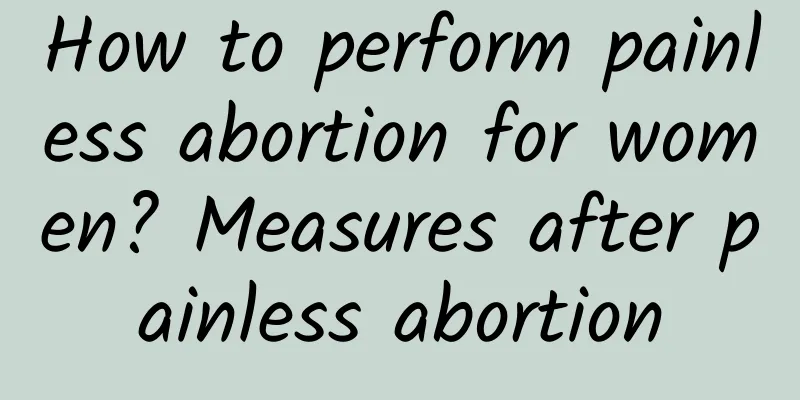What to eat to nourish the uterus after abortion

|
Eating some high-protein and blood-replenishing foods after an abortion can help the uterus recover. 1. High-protein food: Protein is an important component for the body to repair tissues. After abortion, the body needs a lot of protein to repair the endometrium. You can eat more high-protein foods such as eggs, fish, lean meat and beans. These foods not only provide enough protein, but also contain other important nutrients that help the body recover fully. 2. Foods that replenish blood and qi: After an abortion, the body loses a lot of blood, and replenishing blood and qi is the key to recovery. Foods such as red dates, longans, and wolfberries are considered to be good for replenishing blood and qi. Red dates can be cooked into porridge or brewed into tea, longans can be eaten directly or added to soup, and wolfberries can be soaked in water or added to various dishes. These foods can not only replenish blood, but also improve immunity and help the body recover faster. 3. Vitamins and minerals: Vitamins and minerals are equally important for the body's recovery. Vitamin C can promote iron absorption and help replenish blood; vitamin E helps repair damaged endometrium. You can eat more fruits and vegetables, such as oranges, strawberries, spinach and carrots. These foods are not only rich in vitamins, but also rich in fiber, which helps digestion and detoxification. 4. Short-acting contraceptive pills: According to the recommendations of the World Health Organization, taking short-acting contraceptive pills for one or two cycles after abortion can promote the proliferation and repair of the endometrium, reduce bleeding, and prevent infection and intrauterine adhesions. The estrogen and progesterone contained in short-acting contraceptive pills can help the endometrium recover faster, and menstruation can come on time after stopping the medication. 5. Keep clean and rest: In addition to diet, keeping the vulva clean and getting enough rest are also important parts of recovery. Avoiding fatigue and sexual intercourse, especially within two to three weeks after surgery, can effectively prevent uterine infection. If you feel unwell, you should seek medical attention in time and receive standardized treatment under the guidance of a doctor. 6. Psychological adjustment: After abortion, psychological recovery is equally important. You can do some relaxing activities, such as listening to music, reading, taking a walk, etc., to help relieve tension. If you feel too much psychological pressure, you can seek help from a psychologist. The above methods can effectively help the uterus recover and reduce the occurrence of postoperative complications. Remember, the body needs time and nutrition to recover after an abortion. Do not rush to resume daily activities. Give yourself enough time and care. |
<<: What can't you eat if you have vaginitis?
>>: What are the causes of dysmenorrhea?
Recommend
Explain the main causes of ovarian cysts
There are many clinical causes of ovarian cysts, ...
How to regulate irregular menstruation after childbirth 5 tips to deal with irregular menstruation
What should I do if I have irregular menstruation...
Can Chinese medicine cure the root of female cervical erosion? Precautions for Chinese medicine to treat cervical erosion
For gynecological diseases such as cervical erosi...
Three common symptoms indicate cervical erosion
According to the survey, the vast majority of mar...
To prevent the occurrence of ovarian cysts, you need to pay more attention to everything
In life, how should we take preventive measures a...
What are the most important things to pay attention to in painless abortion?
Painless abortion is a common operation to termin...
Experts explain the causes of cervical hypertrophy
Cervical hypertrophy is a disease that women ofte...
Avoid cat's eye! Beware of 6 major injuries when running
Everyone is going crazy for road running! Whether...
Fight stubborn fat! Try Chinese medicinal teas
Obesity is an invisible killer of health. In TCM ...
How can women prevent postpartum cervicitis? 5 preventive measures for postpartum cervicitis
Gynecological diseases such as vaginitis, cervici...
What is the relationship between true and false cervical erosion
Cervical erosion is clinically divided into true ...
Is pelvic peritonitis contagious?
Is pelvic peritonitis contagious? Experts tell us...
Is endometritis or pelvic inflammatory disease serious?
In severe cases, endometritis and pelvic inflamma...
Fatty liver disease reversal victory! Special medicine: Safe weight loss depends on these 4 methods
Can weight loss reverse fatty liver disease? The ...
Postpartum hemorrhage requires early replenishment of qi and blood
Ms. Kong, 31, has been experiencing amenorrhea si...









